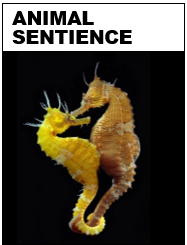 | |
| Discipline | Ethics, animal behavior |
|---|---|
| Language | English |
| Edited by | Stevan Harnad |
| Publication details | |
| History | 2016–present |
| Publisher | WellBeing International |
| Yes | |
| License | CC BY |
| Standard abbreviations | |
| ISO 4 | Anim. Sentience |
| Indexing | |
| ISSN |
2377-7478 |
| LCCN | 2015201663 |
| OCLC no. | 1002278624 |
| Links | |
Animal Sentience: An Interdisciplinary Journal on Animal Feeling is a peer-reviewed academic journal. [1] [2] Its subject matter, animal sentience, concerns what and how nonhuman animals think and feel as well as the scientific and scholarly methods of investigating it and conveying the findings to the general public. [3] The initial publisher was the Animal Studies Repository of the Institute for Science and Policy of The Humane Society of the United States, [4] now the Animal Studies Repository of WellBeing International. [5] The editor-in-chief is Stevan Harnad. [6] [7]
History
The 2012 Cambridge Declaration on Consciousness led to many scientists acknowledging that animals other than humans can feel subjectively and experience qualia.[ citation needed] In response to this, in 2014, the Institute for Science and Policy decided to create a peer-reviewed journal focused on animal sentience. [8] The first issue of Animal Sentience appeared in 2016. [9] [10] A target article on pain in fish in the inaugural issue drew 45 commentary articles as well as media attention. [11] [12]
Publication model
All articles accepted for publication are open to open peer commentary, in which multiple researchers may submit mini-articles criticizing, clarifying, or elaborating on the article from the viewpoint of any research field relevant to its content. [2]
References
- ^ Bekoff, Marc (January 29, 2015). "Doing the Right Thing: An Interview with Stevan Harnad". Psychology Today. Retrieved March 25, 2018.
- ^ a b "Animal Sentience: First-Ever Scientific Journal Focusing on Nonhuman Animal Feeling". Humane Society Veterinary Medical Association. January 22, 2016. Retrieved March 25, 2018.
- ^ Pierce, Jessica (January 6, 2018). "A New Look at Animal Suicide". Psychology Today. Retrieved March 25, 2018.
- ^ Gunther, Marc (January 18, 2018). "Fish Are Getting Their Animal Rights Moment". Civil Eats. Retrieved March 25, 2018.
- ^ "WBI Studies Repository".
- ^ "Animal Sentience: Editorial Board". AnimalStudiesRepository.org. Humane Society of the United States. Retrieved March 25, 2018.
- ^ Lafontaine, Miriam (May 18, 2017). "Animal Rights Activists Still Standing Against Rodeo". The Link. Retrieved March 25, 2018.
- ^ Veit, Walter (March 13, 2020). "4 Years of Animal Sentience". Psychology Today. Retrieved July 25, 2020.
- ^ Noë, Alva (May 6, 2016). "As Thinking On Animal Ethics Shifts, New Journal On Animal Feeling Launches". NPR. Retrieved March 25, 2018.
- ^ Tobias, Michael Charles; Morrison, Jane Gray (2016). Anthrozoology: Embracing Co-Existence in the Anthropocene. Springer Science+Business Media. p. 132. ISBN 978-3-319-45964-6.
- ^ Jabr, Ferris (January 8, 2018). "It's Official: Fish Feel Pain". Hakai Magazine. Retrieved March 25, 2018.
- ^ Bekoff, Marc (December 29, 2015). "Science Shows Fish Feel Pain, So Let's Get Over It and Do Something to Help These Sentient Beings". Huffington Post. Retrieved March 25, 2018.